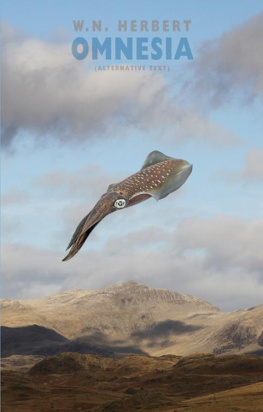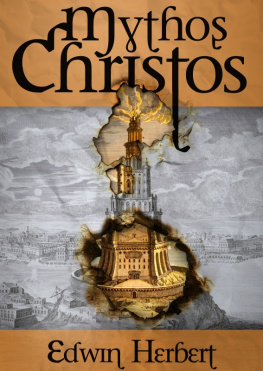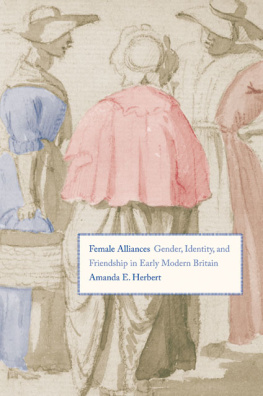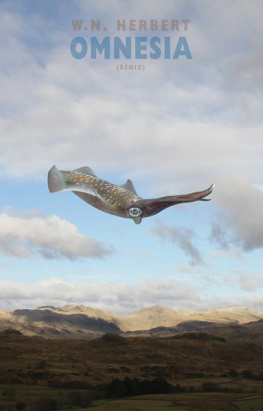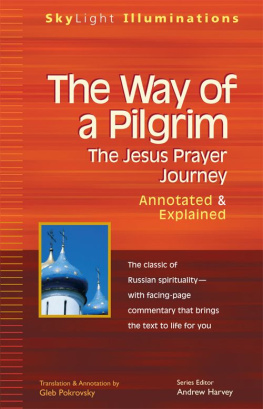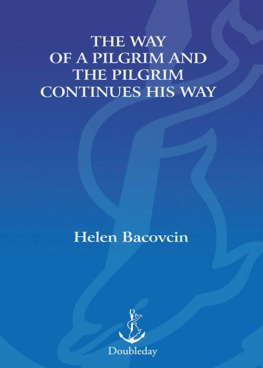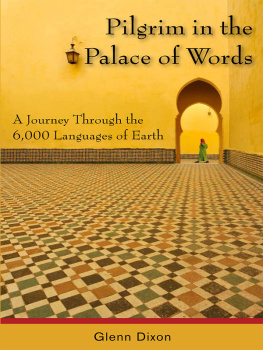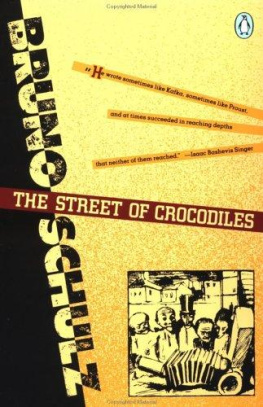W.N. HERBERT
[ ALTERNATIVE TEXT ] Omnesia is Bill Herberts melding of omniscience and amnesia, the modern condition of thinking we can know everything about our world but, in actuality, retaining dangerously little. This doubly impressive new collection published in twin editions,
approaches and evades such flawed totality. For the past seven years Herbert has wandered from the Turkic west of China to the barrios of Venezuela; from Tomsk, the Athens of Siberia, to the heat of Hargeisa, capital of Somaliland, an unacknowledged country. These are travels to translate and, in more than one sense, to be translated; brief encounters with poets and poetics outside the Eurocentric norm; looking-glass meetings, omnesiac pilgrimage. Along the fracture lines between east and west in the Balkans, Greece, and in Jerusalem, across the cultural gaps that mark the north and south of the British Isles, Herbert teases out, through tensions between lyric and satire, English and Scots, formalism and experiment, what it is we hope to mean by home, integrity, or authenticity.
Dear reader, I apologise for the position Ive put you in.
Not just you, but the bookseller, the reviewer, and the various assessors through whose hands one or both aspects of this book has or have had to or will pass or passed and indeed my publisher, who painstakingly produced two mirror versions of it, one of which you are, probably with increasing reluctance, reading now. And to what end? Our culture is as happily full of mash-ups, remixes, and directors cuts, as it is of variorum editions of novelists, poets and playwrights. It is entirely possible in the world of e- (and p-) publishing to imagine any book having several versions, supplemented by additional materials through websites or pamphlets. So, I wondered, why not write a book which absorbs that flexibility into its basic structure? Hence Omnesia, a book in two volumes and neither, its title both a portmanteau and a sort of oxymoron, pairing omniscience (You must know everything) with amnesia, an often traumatic condition of forgetfulness. For me, writing a book of poetry is both of these, simultaneously a shoring up and a letting go. (In fact, for me, being in the world is also like this perhaps thats why so much of this book is on the move, between tones and genres as much as places, not quite at home in any of them.) So writing a book of poetry becomes both punk experiment and prog system.
That is, I go with the emphatic flow of its inspirations, I forget everything a poem should be, and improvise its subjects, its themes, its forms and tones, but at the same time I am constantly trying to orchestrate these into a whole, thinking of them as sections that contrast, complement and speak to each other. This echoes my reading experience, in which any book that has moved, troubled or changed me begins to exist as one version in my head, and another in my hand. To the extent to which it has such an effect, it becomes my book, and begins to be imagined as a collaboration between myself and the author, or by a sort of third mind that knows what we both know. Then, when I re-read the actual book, I find there is so much I have forgotten, or overlooked , or mistaken, that it has become yet another book. These two versions then enter into further dialogue. While I was writing Omnesia or rather while I was lying on a bed daydreaming before an event at the Curt Festival in Galway I began to wonder if these various dynamics could be embodied in two physically distinct but twin-like books.
In my first Bloodaxe volume, Forked Tongue, I had suggested the principle of And not Or to position a poetic of variousness in a market that favours (if not fetishises) concision and restraint. All my books since have been doubled linguistically, stylistically or thematically. Omnesia takes that principle one step further: the various sections in each volume mirror, juxtapose, continue or contrast. Hopefully, they make one sense read in isolation, and a further read together. What this interrelation does not appear to be is a dialectic it is not that debate between thesis and antithesis which our media loves, creating pantomime oppositions in order to pitch common sense against complexity. Its more like the dance between ideas we encounter in the ancient mode of strophe and antistrophe, each step taking the step it echoes and reflecting it onto another level: the epode arises from this, not as a matter of logical synthesis, but as news from nowhere.
Of course, you neednt concern yourself with this unless it engages you: this volume can be read by itself, and only if you are at all moved, troubled or changed need it be considered in conjunction with its non-identical twin. I hope you are (moved, troubled or changed), not least because it will double my sales, a consideration I should confess occurred to me almost immediately after the principles outlined above. Would you believe it, Ariadne? The Minotaur scarcely defended himself. JORGE LUIS BORGES, The House of Asterion The whole is the false. ADORNO, Minima Moralia
I left my bunnet on a train Glenmorangie upon the plane, I dropped my notebook down a drain; I failed to try or to explain, I lost my gang but kept your chain say, shall these summers come again, Omnesia? Youd like to think its God that sees ya(while Hes painting the parrots of Polynesia)give your wife that fragrant freesiaand not the eye of Blind Omnesia. I scrabbled here and scribbled there a sphere of peers declined to care; I roomed with hibernating bears and roamed where cartoon beagles dare: protect me by not being there, Our Lady of Congealed Despair, Omnesia! Youd like the universe to please ya,your admin duties to be easier,instead you grip the pole thats greasierthe shinbone of unskinned Omnesia. I wibbled there and wobbled here, forgot the thousandth name of beer; I filled my head with clashing gears and tried to live in other years; I passed on fame, selected fear, watered your name with Poor Bill tears, Omnesia So you lack ambition and pelf dont tease ya?still, me-memed mugwump prats police ya,and Brit-farce forces queue to seize yafor the purloined pearls of Aunt Omnesia. Id like to think the Muse remembers not that teaching starts in late September but the first of fires dying embers, that glow on Cleopatras members; my further lovers choric timbres Did I fiddle with their numbers, Omnesia? You hope it isnt Fate who knees ya,the Ship of Fools which makes you queasier,or Mister Scythey come to ease ya

